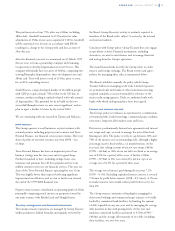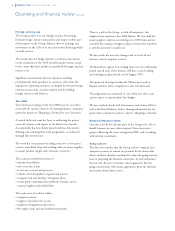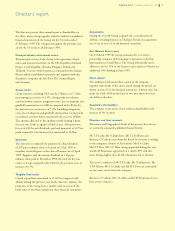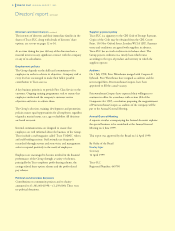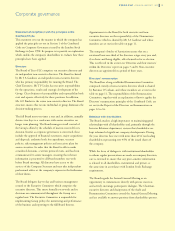Tesco 1999 Annual Report Download - page 15
Download and view the complete annual report
Please find page 15 of the 1999 Tesco annual report below. You can navigate through the pages in the report by either clicking on the pages listed below, or by using the keyword search tool below to find specific information within the annual report.
TESCO PLC ANNUAL REPORT 1999 13
Profit-sharing
The Group operates an approved employee profit-sharing
scheme for the benefit of all employees, including executive
directors, with over two years’ service with the Group at its year
end. Shares in the company are allocated to participants in the
scheme on a pro rata basis to base salary earned up to Inland
Revenue approved limits.
Executive incentive scheme
The company operates performance-related award schemes
designed to provide a growing element of variable reward to
reflect the performance of the Group. The executive incentive
scheme introduced in March 1993 was designed and
introduced for this purpose.
Long term share bonuses are awarded annually, based on
improvements in earnings per share, achievement of strategic
corporate goals and comparative performance against peer
companies including total shareholder return. The maximum
long term bonus is 25% of salary. Shares awarded have to be
held for a period of four years, conditional upon continuous
service with the company. The share equivalent of dividends
which would have been paid on the shares is added to the
award during the deferral period.
Short term share bonuses are awarded annually, based on
improvements in earnings per share and on the achievement of
strategic corporate goals. The maximum short term bonus
payable is 25% of salary, which is augmented by up to a further
121⁄2% of salary if the participants elect for the trustees of the
scheme to retain the fully paid ordinary shares awarded for a
minimum period of two years, conditional upon continuous
service with the company. The share equivalent of dividends
which would have been paid on the shares is added to the
award during the deferral period.
Table 2 Gains made on share options Number of shares at exercise price (pence) Value realisable
Price at
exercise 1999 1998
72.3(a) 72.3 77.3 90.3 104.0 Total pence £000 £000
Mr T P Leahy – – ––––––125
Mr D E Reid –– ––––––903
Mr R S Ager 69,123 – – 119,556 255,312 443,991 182 386 363
Mr P A Clarke – – – – 251,580 251,580 165 153 –
Mr J Gildersleeve – – 43,968 256,824 623,157 923,949 183 781 585
Mr A T Higginson – – –––––––
Mrs L James – – – 223,182 300,048 523,230 187 466 223
Mr T J R Mason – – – 291,552 437,805 729,357 180 594 111
Mr D T Potts 59,622 – 79,713 – 393,432 532,767 172 410 –
Mr J M Wemms – 27,648 – 128,412 100,000 256,060 183 232 228
Date of grant 29 October 1992 27 May 1993 29 September 1994 27 April 1995 13 October 1995
a) Mr D T Potts exercised these options at a discounted rate of 61.7p as targets relating to growth in earnings per share have been
achieved in accordance with ABI guidelines.
The value realisable from shares acquired on exercise is the difference between the fair market value at exercise and the exercise price
of the options, although the shares may have been retained. Where individual directors exercised options on different dates and sold
the shares, the price at exercise shown represents an average of the prices on these dates weighted to the number of options exercised.
The market price of the shares at 27 February 1999 was 177p. The share price during the 52 weeks to 27 February 1999 ranged
from 157p to 202p.




